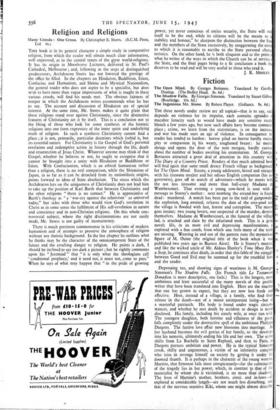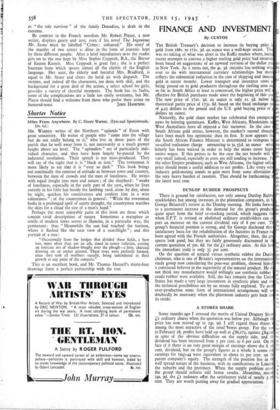Fiction
The Open Mind. By Georges Berinnos. Translated by Geoffr Dunlop. (The Bodley Head. 8s. 6d.) The Shadow Falls. By Georges Simenon. Translated by Stuart Gilbert (Routledge. 10s. 6d.) The Ingenious Mr. Stone. By Robert Player. (Gollsocz. 8s. 6d.)
THE three novels under review are all topical—that is to say, ea depends on violence for its impulse, each contains episodes macabre ferocity such as would have made any sensitive reada blench a few years ago, but now such affairs have become common. place ; crime, we learn from the statisticians, is on the increase and war has made ours an age of violence. In consequence the reader has tended to harden: horror piled on horror hardly excites pity or compassion int his weary, toughened breast: he merely shrugs and opens the door of the next morgue, hardly curious about the number of bodies awaiting his examination. M. Georges Bernanos attracted a great deal of attention' in this country with The Diary of a Country Priest. Readers of that much admired book will find again that same small dreary French village as background for The Open Mind. S teeny, a young adolescent, bored and enraged with his tiresome mother and her odious English companion (his ex governess), goes off in search of adventure—which he meets with the not less tiresome and more than half-crazy Madame d Wambescourt. That evening a young cow-herd is sent with message to Steeny's mother : next morning the errand-boy is fou dead : murdered. A match has been put to the trail of gunpowder the explosion, long awaited, releases the dam of the cess-pool an the village is flooded with lust, horror and corruption. The may goes insane; two young lovers, one suspected of the murder, destroy themselves. Madame de Wambescourt, at the funeral of the village lad, is attacked and slain by the infuriated mob. This is a grim 7. novel; life, in its most evil and depressing manifestations, is explored with a fine comb, from which one feels many of the teeth are missing. Weaving in and out of the pattern runs the mysterious figure of M. Ouine (the original title of the book when it was published two years ago in Buenos Aires). He is Steeny's mentor and like the wicked uncle of Mr. Aldous Huscley's Time Must Have a Stop, he continues after death, in order that this fable of the struggle between Good and Evil may be summed up for the youthful hero and the reader.
Depressing too, and showing signs of weariness is .M. Georges Simenon's The Shadow Falls. (Its French title Le Testament Donadieu is more descriptive, one feels.) This is the longest, most ambitious and least successful of the many novels of this prolific writer that have been translated into English. Here are the touches that one has grown to expect, but they are now less fresh and effective. Here, instead of a village, is a family, who find their release in the death—not of a minor unimportant being—but 0: a masterful patriarch. His body is found under tragic circum- stances, and whether he met death by accident or design is never disclosed. His family, including his stately wife, at once run wild- The youngest daughter, both heroine and villainess of the piece, falls completely under the destructive spell of the ambitious Philippe Dargens. The furtive love affair now blossoms into marriage. As her husband becomes the evil genius of her family, so she develops into his nemesis, ultimately ending his life and her own. The scene shifts from La Rochelle to Saint Raphael, and then to kiris, as Dargens pursues ambition and power. He is the typical Simenon crook, shifty and ungenerous a victim of an inferiority complex who tries to revenge himself on society by getting it under his doomed thumb. It is perhaps in the character of the young woman, Martine, that Simenon fails most conspicuously—for the culmination of the tragedy lies in her power, which, in contrast to that of the materialist by whom she is victimised. is no more than' shadowY. The lives of Martine's mother, brothers, sister. and in-laws—all explored at considerable length—are not much less disturbing, and that of the nervous sensitive Kiki„ whom one might almost describe
as "the sole survivor" of the family Donadieu, is drab in the extreme.
By contrast to the French novelists Mr. Robert Player, a new writer, displays gaiety and zest, even if his novel The Ingenious Mr. Stone must be labelled "Crime: coloured." His story of the murder of two sisters is dOne in the form of journals kept by three different people. After a brief introductory note the reader gets on to the one kept by Miss Sophie Coppock, B.A., the Bursar of Easton Knoyle. Miss Coppock. is great fun ; she is a perfect fountain from which spouts almost all the clichés of the English language. Her aunt, the elderly and forceful Mrs. Bradford, is equal to Mr. Stone and clears the lurid air with dispatch. The victims, and indeed all the characters, are done with skill, and the background for a great deal of the action, a select school for girls, provides a variety of cheerful moments. The book has its faults, some of the complications are a little too easily overcome, but Mr. Player should find a welcome from those who prefer their crime on



























 Previous page
Previous page